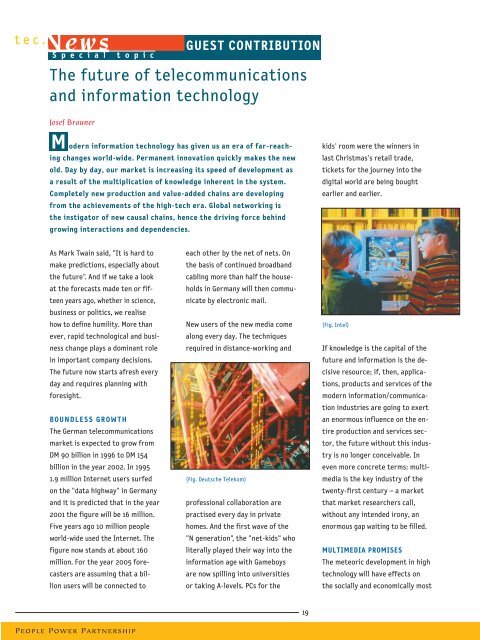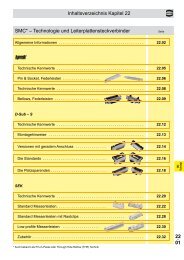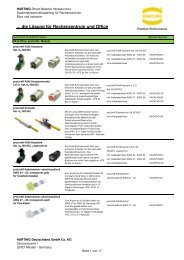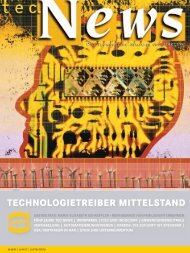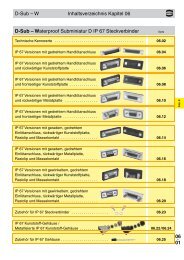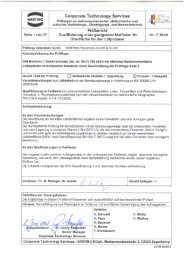tec.News - Harting
tec.News - Harting
tec.News - Harting
You also want an ePaper? Increase the reach of your titles
YUMPU automatically turns print PDFs into web optimized ePapers that Google loves.
<strong>tec</strong>.<br />
S p e c i a l t o p i c<br />
GUEST CONTRIBUTION<br />
The future of telecommunications<br />
and information <strong>tec</strong>hnology<br />
Josef Brauner<br />
M<br />
odern information <strong>tec</strong>hnology has given us an era of far-reaching<br />
changes world-wide. Permanent innovation quickly makes the new<br />
old. Day by day, our market is increasing its speed of development as<br />
a result of the multiplication of knowledge inherent in the system.<br />
Completely new production and value-added chains are developing<br />
from the achievements of the high-<strong>tec</strong>h era. Global networking is<br />
the instigator of new causal chains, hence the driving force behind<br />
growing interactions and dependencies.<br />
kids' room were the winners in<br />
last Christmas's retail trade,<br />
tickets for the journey into the<br />
digital world are being bought<br />
earlier and earlier.<br />
As Mark Twain said, "It is hard to<br />
make predictions, especially about<br />
the future". And if we take a look<br />
at the forecasts made ten or fifteen<br />
years ago, whether in science,<br />
business or politics, we realise<br />
how to define humility. More than<br />
ever, rapid <strong>tec</strong>hnological and business<br />
change plays a dominant role<br />
in important company decisions.<br />
The future now starts afresh every<br />
day and requires planning with<br />
foresight.<br />
BOUNDLESS GROWTH<br />
The German telecommunications<br />
market is expected to grow from<br />
DM 90 billion in 1996 to DM 154<br />
billion in the year 2002. In 1995<br />
1.9 million Internet users surfed<br />
on the "data highway" in Germany<br />
and it is predicted that in the year<br />
2001 the figure will be 16 million.<br />
Five years ago 10 million people<br />
world-wide used the Internet. The<br />
figure now stands at about 160<br />
million. For the year 2005 forecasters<br />
are assuming that a billion<br />
users will be connected to<br />
each other by the net of nets. On<br />
the basis of continued broadband<br />
cabling more than half the households<br />
in Germany will then communicate<br />
by electronic mail.<br />
New users of the new media come<br />
along every day. The <strong>tec</strong>hniques<br />
required in distance-working and<br />
(Fig. Deutsche Telekom)<br />
professional collaboration are<br />
practised every day in private<br />
homes. And the first wave of the<br />
"N generation", the "net-kids" who<br />
literally played their way into the<br />
information age with Gameboys<br />
are now spilling into universities<br />
or taking A-levels. PCs for the<br />
(Fig. Intel)<br />
If knowledge is the capital of the<br />
future and information is the decisive<br />
resource; if, then, applications,<br />
products and services of the<br />
modern information/communication<br />
industries are going to exert<br />
an enormous influence on the entire<br />
production and services sector,<br />
the future without this industry<br />
is no longer conceivable. In<br />
even more concrete terms: multimedia<br />
is the key industry of the<br />
twenty-first century – a market<br />
that market researchers call,<br />
without any intended irony, an<br />
enormous gap waiting to be filled.<br />
MULTIMEDIA PROMISES<br />
The meteoric development in high<br />
<strong>tec</strong>hnology will have effects on<br />
the socially and economically most<br />
19<br />
People Power Partnership


